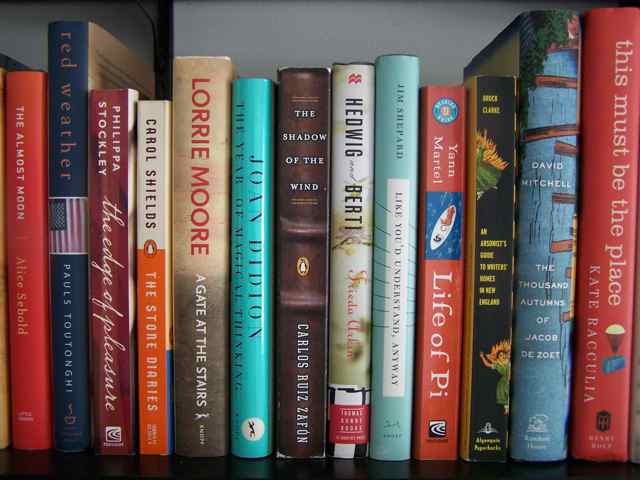 Between the World and Me by Ta-Nehisi Coates is a long essay written in the form of a letter to his adolescent son, which won the National Book Award last year.
Between the World and Me by Ta-Nehisi Coates is a long essay written in the form of a letter to his adolescent son, which won the National Book Award last year.
It’s as moving as you’ve probably already heard it is. Next, I need to read the author’s earlier memoir, The Beautiful Struggle, about his relationship with his father and growing up in West Baltimore.
I marked so many passages as I read, I can’t quote them all. The author has written this short book in a style that is both mythic and realistic. He makes sweeping statements about history, society, religion, etc. in one passage and addresses his son specifically in the next. Throughout the book, he calls Howard University “Mecca”, and refers to “the Dream” (i.e. the life he used to see depicted on TV, growing up) and “the Dreamers” (those who don’t recognize the roots of their privilege).
Throughout the book, he uses the phrase “people who believe themselves to be white” to encompass all who are not considered “white” (by the census takers? by the majority? by the “one-drop” rule?) and he frequently refers to “possession” of his “body” to get at the idea that for people without religious faith, this life – this body, brain, heart, soul, mind, spirit — is all we each have, and every “body” should matter as much as the others.
The author uses this unusual language to underscore the fact that “race” is a human construct, not a law of nature. We are one race – the human race; dividing lines exist only in our minds. Ideally, those lines will become so fluid in the future as to be nonexistent, even there.
“But race is the child of racism, not the father. And the process of naming ‘the people’ has never been a matter of genealogy and physiognomy so much as one of hierarchy. Difference in hue and hair is old. But the belief in the preeminence of hue and hair, the notion that these factors can correctly organize a society and that they signify deeper attributes, which are indelible – this is the new idea at the heart of these new people who have been brought up hopelessly, tragically, deceitfully, to believe that they are white.
These new people are, like us, a modern invention. But unlike us, their new name has no real meaning divorced from the machinery of criminal power. The new people were something else before they were white — Catholic, Corsican, Welsh, Mennonite, Jewish — and if all our national hopes have any fulfillment, then they will have to be something else again. Perhaps they will truly become American and create a nobler basis for their myths. I cannot call it. As for now, it must be said that the process of washing the disparate tribes white, the elevation of the belief in being white, was not achieved through wine tastings and ice cream socials, but rather through the pillaging of life, liberty, labor, and land; through the flaying of backs; the chaining of limbs; the strangling of dissidents; the destruction of families; the rape of mothers; the sale of children; and various other acts meant, first and foremost, to deny you and me the right to secure and govern our own bodies.” — Between the World and Me, pp. 9–10
The author’s mixed feelings of hope and despair about the future are evident in this book, this letter to his 15-year-old son who responded with anguished disbelief to the 2014 grand jury decision not to indict Darren Wilson, the police officer who killed Michael Brown in Ferguson.
Despair outweighs hope by a landslide. But there is a section describing the author’s first visit to Paris and the sense of freedom he experienced there, and, in fact, the author is living with his family in France, since writing this book.
Here’s a passage about the author’s time in “Mecca” (Howard University) where he fell in love, and fell in love with the school, if not with his classes:
I would take breaks from my reading, walk out to the vendors who lined the streets, eat lunch on the Yard. I would imagine Malcolm [X], his body bound in a cell, studying the books, trading his human eyes for the power of flight. And I too felt bound by my ignorance, by the questions that I had not yet understood to be more than just means, by my lack of understanding, and by Howard itself. It was still a school, after all. I wanted to pursue things, to know things, but I could not match the means of knowing that came naturally to me with the expectations of professors. The pursuit of knowing was freedom to me, the right to declare your own curiosities and follow them through all manner of books. I was made for the library, not the classroom. The classroom was a jail of other people’s interests. The library was open, unending, free. Slowly, I was discovering myself. The best parts of Malcolm pointed the way. Malcolm, always changing, always evolving toward some truth that was ultimately outside the boundaries of his life, of his body. I felt myself in motion, still directed toward the total possession of my body, but by some other route which I could not before then have imagined. — Between the World and Me, p. 48
Between the World and Me
Coates, Ta-Nehisi
Spiegel & Grau, July 2015
9780812993547
176 pp.
$24.00, U.S.
Disclosure: I read a public library copy of this book. I think the author would approve.
Other opinions:
BlogHer
Book Journey
The Book Wheel (audiobook)
Estella’s Revenge (mini review)
Lovely Bookshelf

